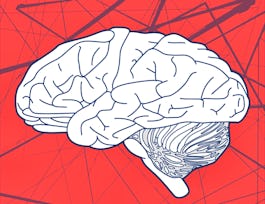How do we make decisions as consumers? What do we pay attention to, and how do our initial responses predict our final choices? To what extent are these processes unconscious and cannot be reflected in overt reports? This course will provide you with an introduction to some of the most basic methods in the emerging fields of consumer neuroscience and neuromarketing. You will learn about the methods employed and what they mean. You will learn about the basic brain mechanisms in consumer choice, and how to stay updated on these topics. The course will give an overview of the current and future uses of neuroscience in business.



An Introduction to Consumer Neuroscience & Neuromarketing

Instructor: Thomas Zoëga Ramsøy
Sponsored by Louisiana Workforce Commission
196,142 already enrolled
(3,345 reviews)
Skills you'll gain
Details to know

Add to your LinkedIn profile
5 assignments
See how employees at top companies are mastering in-demand skills


Earn a career certificate
Add this credential to your LinkedIn profile, resume, or CV
Share it on social media and in your performance review

There are 6 modules in this course
We first need to define the field – what are the key concepts, what are the key methods and reasons for employing neuroscience to study consumers and communication effects? In this module, we will introduce the topic and how some specific studies provide key insights into what neuroscience has to offer in relationship with more traditional methods.
What's included
4 videos2 readings1 assignment
In the second module of this course we are turning to the functions of the brain, and we will first focus on attention and consciousness. This module will focus on some key concepts in attention and consciousness.
What's included
4 videos1 reading1 assignment
In this module we will have contents filled on the topic of sensory neuromarketing. How are our senses affected differently as consumers? What can you do to organise your communications to better use all the senses? How does the brain actually use the senses? What tools do we have for assessing the use of senses, and how they affect consumers?
What's included
5 videos1 reading1 assignment
In this module, everything is about emotions and feelings, and the relationship between emotions and preference. As we will see, our minds have a dual side: a conscious and an unconscious response and motivation, which are crucial to understanding consumer preference and choice. Indeed, unconscious emotional responses may turn out to be driving consumer choice to the same - or even larger - degree than conscious feelings. Are conscious feelings a mere after-the-fact rationalization upon conscious choice?
What's included
4 videos1 reading1 assignment
This module will focus on Learning & Memory. We will determine not only that there are multiple kinds of memory, but that they also serve multiple purposes. If anything, learning is the vehicle we need to understand the most in consumer behaviour. What causes memory, and can we be affected unconsciously by our memories? How can we measure memory effects, and what is the relationship between brand equity and the brain? This module, we also have an interview with Prof. Richard Silberstein, who shares his view on neuromarketing and consumer neuroscience. Prof. Silberstein is the Founder and chairman of the neuromarketing company Neuro-Insight (http://www.neuro-insight.com/).
What's included
3 videos1 reading1 assignment
This module, we will focus on both the ethics of neuromarketing, as well as aberrant consumer behaviours. We see that consumer choice can sometimes become the centre focus on a person's life, be it pathological gambling, "shopaholism" or digital dependencies. This module, we will focus on some of these issues, and combine them with the ethical aspects that we face when talking neuro. This module we also end off with two interviews: one with Prof. Jan Trzaskowksi at the CBS, who is working on marketing and the law, where we discuss what the ethical and legal aspects of neuromarketing is. As you will see, Jan has a very particular take on this that I am sure you will find interesting. Our second interview is with Carl Marci, who is the Co-Founder and Chief Science Officer of Innerscope Research (http://innerscoperesearch.com/) on his background and their take on neuromarketing and consumer neuroscience.
What's included
4 videos1 reading1 peer review
Instructor

Offered by
Why people choose Coursera for their career




Learner reviews
3,345 reviews
- 5 stars
74.65%
- 4 stars
20.14%
- 3 stars
3.52%
- 2 stars
1.04%
- 1 star
0.62%
Showing 3 of 3345
Reviewed on Aug 15, 2017
All in all, it was a good course to begin with the neuroscience aspect of marketing. However, it was a bit more focused on consumer neuroscience rather than its marketing aspect.
Reviewed on Nov 21, 2019
Very interesting and detailed study of consumer behavior. The concepts were understandable and many new things, methods and concepts were explained in this course. It was really helpful.
Reviewed on Mar 30, 2020
Thomas has the rare ability to explain the difficult concepts in relatively simple terms. I think that this course provides a good introduction on consumer neuroscience for beginners.
Recommended if you're interested in Business

Johns Hopkins University

Johns Hopkins University

Copenhagen Business School

Johns Hopkins University

Open new doors with Coursera Plus
Unlimited access to 10,000+ world-class courses, hands-on projects, and job-ready certificate programs - all included in your subscription
Advance your career with an online degree
Earn a degree from world-class universities - 100% online
Join over 3,400 global companies that choose Coursera for Business
Upskill your employees to excel in the digital economy


